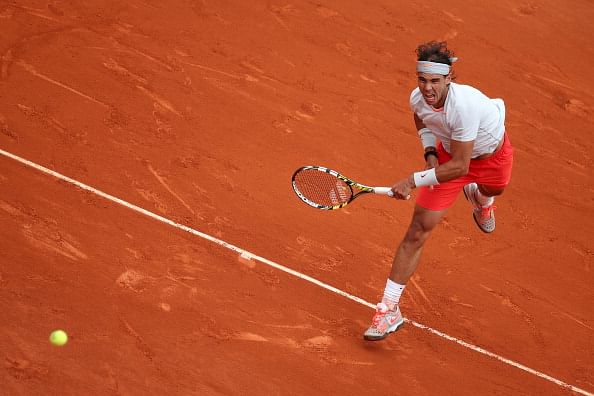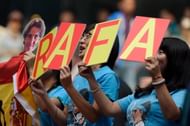Spain ought to collect and preserve the DNA of a certain Rafael Nadal. In the distant future when science evolves to blur the lines with divine power, they could set out from the Mediterranean coast and conquer the world with its potent force. All they will need is to produce a few humanoids with the Nadal spirit flowing through their synthetic cells.
The irrepressible Mallorcan bared his guts for everyone to see inside the National Tennis Centre in Beijing, leaving those witnesses numb in disbelief. In yet another exhibition of raw instinct, Nadal scripted a typically resilient comeback from near death at the China Open to underline the fact that his opponents need to walk over the Spaniard’s dead body to claim victory.
After an exhilarating season that has resembled a dream, Nadal is very much alive and within a whisker now of snatching the top rank from Novak Djokovic. Fabio Fognini smelled victory, but like many of Nadal’s victims, the scent of it intoxicated him into a fatal sense of comfort. Nadal mounted a typically spirited rearguard action to stupefy the Italian into surrendering the kingdom from a position of great strength.
In reality Nadal is a misty mountain disguised as a tennis player. The haze in the air clouds the true measure of the mountain but then the mist also serves to mystify its countenance. The humble soldier goes out of the way to help you believe that the task that faces him is a monumental effort, that every match is indeed a stern test.
But once on the court, Nadal throws away that cloak of humility and unleashes the beast within with venom and vigour. Even as his opponents admire the regal grandeur of the misty peak, they are brought face to face with a visceral creature that emerges from within the mountain to consume them whole.
Nadal has been trained by his uncle Toni to learn and develop the instincts of a predator and the patience of a Siberain Tiger. He is a player constantly on his toes but never on edge. Nadal has a refined understanding of the fact that a match isn’t really over until he has lost the last bloodied point. And he is ever willing to stretch his last sinew, if he has to, in order to hunt down even his mightiest enemy.
The Spaniard, it seems, has a spare set of veins that leap forth at the first hint of trouble. They enable the indefatigable Nadal to summon a few extra steps and the one additional stroke needed to get the better of the man in front. Of course, the fact that Nadal turned around a nearly lost match against Fabio Fognini was impressive, but there were a couple of moments that left an indelible imprint.
The first of those came when the Italian was serving for the first set at 5-1. Nadal was looking powerless against the penetrating ground strokes of his belligerent opponent. Fognini was taking it early and striking it clean for much of that first set. But with his back to the wall, Nadal made a typically determined effort to force Fognini on to the defensive, eking out a little more power on each of his strokes.
He did lose the set, but that break helped underline a fact – Nadal was going to be most dangerous when he was stuck in the trenches. The Spaniard made good on that promise a little later. At 15-40, 0-3 in the fourth game of the second set Nadal was literally staring at the barrel. A second break of serve might have proven fatal, though with the Majorcan you never really know.
As it is, Nadal fought back vigorously to save those break points and remain within touch of his speeding opponent. After surviving another break point in the sixth game, once again with bloody minded determination, Nadal had done enough to unsettle the confidence of his opponent. The strike had been made and once again Nadal succeeded in the brutal art of turning the hunter into the hunted.
The Spaniard has a great knack of lifting himself off the mat and turning aggressor by leaning on the strength of his consistency. He had done it to the best of them, including his arch rivals Novak Djokovic, Roger Federer and Andy Murray, in the greatest of amphitheatres that tennis has had to offer. So much so, that his opponents rarely feel safe even if Nadal were down a double break in the decider.
Nadal’s comments in the aftermath of the match were most educating, providing an insight into the corridors of his fearless mind. “If you are only one break away, at the end of the match pressure is there, nerves are there,” he explained, as he discussed the dynamics of finding his feet back in a difficult situation. “You try to put one more ball inside, try to find a little bit more, play a little bit more, and probably you are going to have the chance.”
Walking you further inside his mind, Nadal elaborated, “when you are playing against an opponent playing well, the thing that you have to do is try to push him to the limit and try to make him play very well for a very, very long time.” Most often his opponents wilt, knowing that they need to paint the lines repeatedly just to hang with the impervious Spaniard.
But Nadal was off the court by now and the beast was safely tucked away in a cosy bed. The humble, almost insinuatingly polite avatar of the great warrior was back to the fore. “I am going to have a very tough opponent in front of me. In the end, it’s another match,” waxed Nadal about his next opponent. “I am going to try to be competitive and try to play my best tennis. If not, I am going to have no chance to be through. It is not the moment to think about No. 1; it is the moment to think about Berdych.”
As educating as those words are from the greatest warrior in modern tennis, even to consider that they may have spilt out of Nadal’s heart would be the worst mistake an opponent can make. Because Nadal lies in wait like a hungry tiger, eager for the next opportunity to tear into yet another hapless opponent. A grand feast awaits his many followers when Nadal takes the court to try and put it past Berdych in the semifinals, in the process reclaiming the number one ranking for the first time since 2011.


